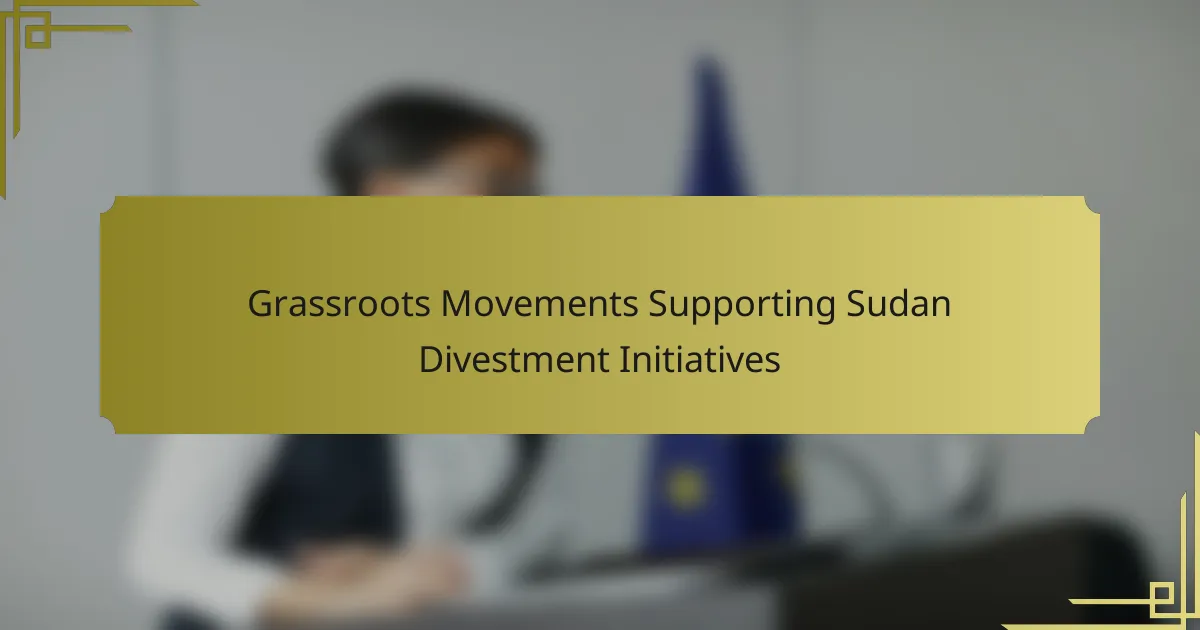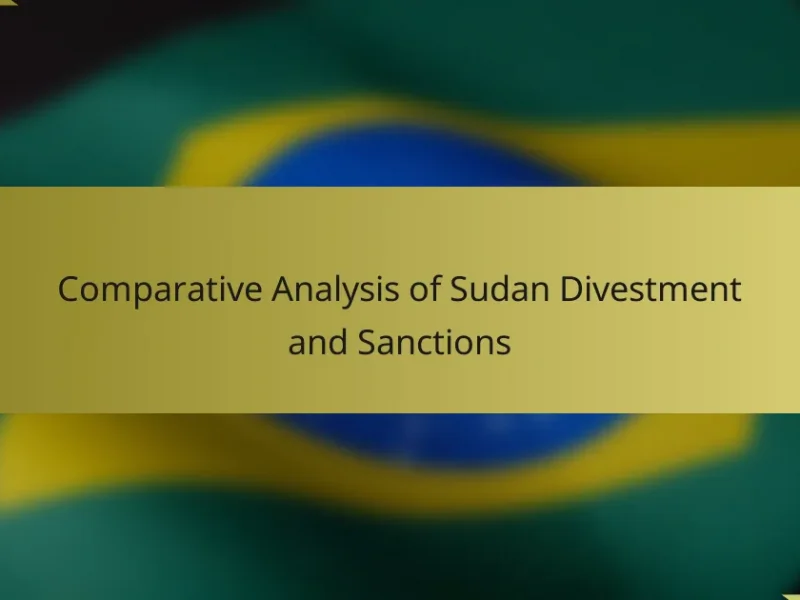Grassroots movements supporting Sudan divestment initiatives are organized efforts aimed at encouraging individuals and institutions to withdraw investments from companies operating in Sudan due to human rights abuses and conflicts. These movements, including the Sudan Divestment Task Force and various university-led campaigns, utilize strategies such as petitions, protests, and educational events to raise awareness and pressure the Sudanese government for policy changes. Despite facing challenges like limited funding, public awareness issues, legal barriers, and political opposition, these initiatives have demonstrated the potential impact of divestment on corporate behavior and government actions. Individuals can engage with these movements by participating in campaigns, advocating on social media, attending events, and educating themselves and others about the situation in Sudan.
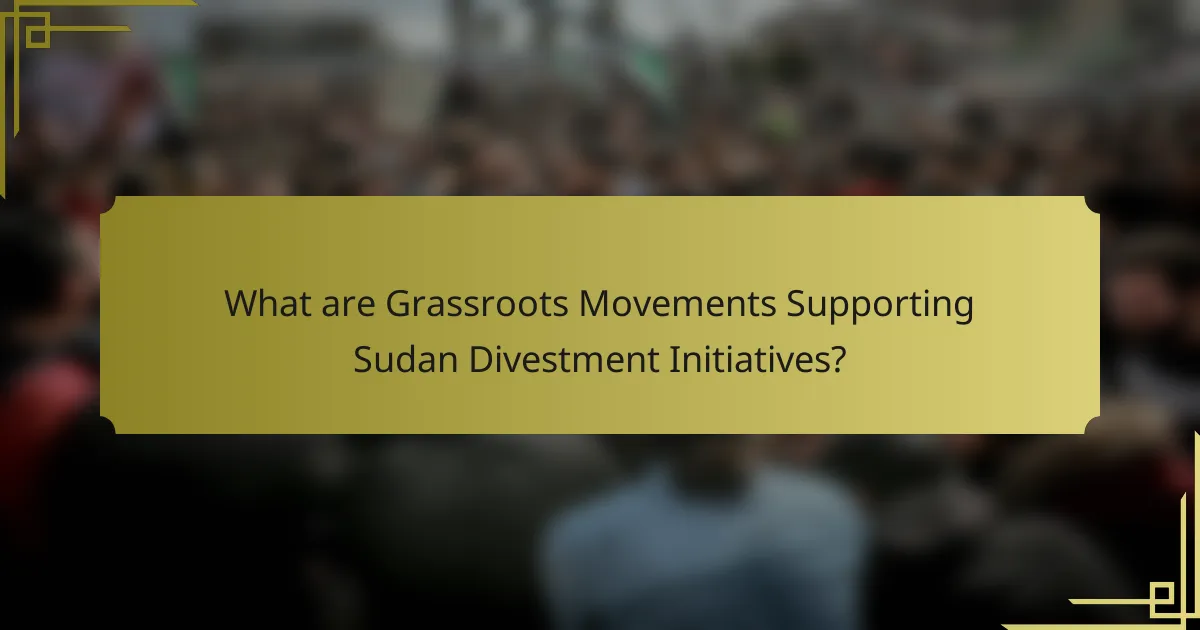
What are Grassroots Movements Supporting Sudan Divestment Initiatives?
Grassroots movements supporting Sudan divestment initiatives are organized efforts focused on encouraging individuals and institutions to withdraw investments from companies operating in Sudan. These movements aim to raise awareness about human rights abuses and conflicts in Sudan. They mobilize communities to advocate for ethical investment practices. Notable examples include the Sudan Divestment Task Force and various university-led campaigns. These initiatives often utilize petitions, protests, and educational events to garner support. They highlight the impact of divestment on pressuring the Sudanese government to change its policies. Research indicates that divestment can influence corporate behavior and government actions. Reports show that grassroots efforts have led to significant financial withdrawals from Sudan-related investments.
How do grassroots movements contribute to Sudan divestment initiatives?
Grassroots movements play a crucial role in Sudan divestment initiatives by raising awareness and mobilizing support. They often focus on educating the public about the human rights abuses and conflicts in Sudan. This education fosters a sense of urgency among community members and stakeholders. Grassroots organizations also advocate for policy changes at local, national, and international levels. They organize campaigns that pressure businesses and governments to divest from Sudan. For example, campaigns like “Divest Sudan” have successfully influenced universities and pension funds to withdraw investments. Additionally, grassroots movements create networks that connect activists and supporters globally. This collaboration amplifies their impact and broadens the reach of their message. Overall, grassroots movements are essential in driving divestment efforts through advocacy, education, and community engagement.
What are the key characteristics of these grassroots movements?
Grassroots movements supporting Sudan divestment initiatives are characterized by community-driven participation. These movements often emerge from local communities aiming to influence policy and corporate behavior. They utilize collective action to raise awareness about issues related to Sudan. Engagement typically includes protests, campaigns, and educational outreach. These movements emphasize inclusivity, welcoming diverse voices and perspectives. They often rely on social media to mobilize support and disseminate information quickly. A notable aspect is their focus on ethical and sustainable investment practices. Historical context reveals that these movements have effectively pressured institutions to reconsider their investments in Sudan.
How do these movements mobilize community support?
Grassroots movements mobilize community support through awareness campaigns and grassroots organizing. They utilize social media to spread information rapidly. Engaging storytelling resonates with community members. These movements often host events to foster direct interaction. Collaborations with local organizations enhance credibility and reach. They provide clear action steps for community involvement. Research shows that personal connections increase participation rates. For example, the Sudan divestment movement successfully engaged universities through student-led initiatives.
Why is Sudan divestment important?
Sudan divestment is important because it aims to reduce economic support for the Sudanese government, which has a history of human rights abuses. By withdrawing investments, stakeholders signal disapproval of these actions. This divestment can pressure the government to change its policies. Historical examples show that economic pressure can lead to political change. For instance, divestment efforts during apartheid in South Africa contributed to the end of that regime. Additionally, divestment can mobilize grassroots movements, raising awareness and fostering solidarity. Engaging communities through advocacy increases the impact of these initiatives. Overall, Sudan divestment aligns economic actions with ethical considerations.
What are the ethical implications of divestment from Sudan?
Divestment from Sudan raises significant ethical implications. It involves withdrawing investments from entities that contribute to human rights abuses. This action can signal disapproval of oppressive regimes, such as the Sudanese government during the Darfur conflict.
Ethically, divestment aims to pressure governments to change harmful policies. It reflects a commitment to social justice and human rights. For instance, organizations like the Sudan Divestment Task Force advocate for such measures. They highlight the need to hold violators accountable through economic means.
However, divestment can also have unintended consequences. It may impact ordinary citizens who rely on the economy for their livelihoods. Ethical considerations must balance the need for accountability with potential harm to vulnerable populations.
Overall, the ethical implications of divestment from Sudan involve complex considerations of justice, responsibility, and potential consequences for the affected communities.
How does divestment impact the Sudanese economy?
Divestment negatively impacts the Sudanese economy by reducing foreign investment and capital inflow. When investors withdraw, the country faces decreased funding for essential services and infrastructure. This can lead to higher unemployment rates and increased poverty levels. Additionally, divestment can weaken the local currency, causing inflation to rise. Historical data shows that divestment campaigns in Sudan have resulted in significant economic downturns. For instance, after the divestment from oil and mining sectors, Sudan experienced a decline in GDP growth. Overall, divestment creates a challenging economic environment for Sudan.
What strategies do grassroots movements use to promote divestment?
Grassroots movements promote divestment through various strategies. They often utilize public awareness campaigns to educate communities about the impacts of investments in certain sectors. These campaigns may include social media outreach, community events, and informational materials.
Additionally, grassroots movements engage in direct advocacy. They lobby decision-makers to encourage divestment from controversial investments. This can involve organizing petitions and coordinating meetings with lawmakers.
Coalition-building is another key strategy. Grassroots movements often collaborate with other organizations to amplify their message. By uniting various stakeholders, they can exert greater influence.
They also employ strategic boycotts. By encouraging individuals to withdraw their financial support from companies linked to harmful practices, they create economic pressure.
Lastly, grassroots movements leverage storytelling to humanize the issues at stake. Personal narratives can resonate deeply and inspire action among supporters. This multifaceted approach effectively drives the divestment agenda forward.
How do these movements raise awareness about Sudan divestment?
Grassroots movements raise awareness about Sudan divestment through organized campaigns and educational efforts. These movements utilize social media platforms to disseminate information widely. They host events and rallies to engage communities directly. Collaborations with universities and organizations amplify their message. They provide resources that detail the implications of investments in Sudan. By sharing personal stories, they humanize the impact of divestment. Advocacy for policy changes at local and national levels further increases visibility. These actions collectively inform the public about the urgency of divesting from Sudan.
What role does social media play in grassroots advocacy?
Social media serves as a crucial tool for grassroots advocacy. It enables organizations and individuals to mobilize support quickly and effectively. Platforms like Twitter and Facebook facilitate real-time communication. This allows advocates to share information, updates, and calls to action. The viral nature of social media helps amplify messages beyond traditional media reach. Research shows that campaigns utilizing social media can increase engagement and participation rates significantly. For example, the Sudan divestment movement gained momentum through online petitions and social sharing. This demonstrates how social media can enhance visibility and support for grassroots initiatives.
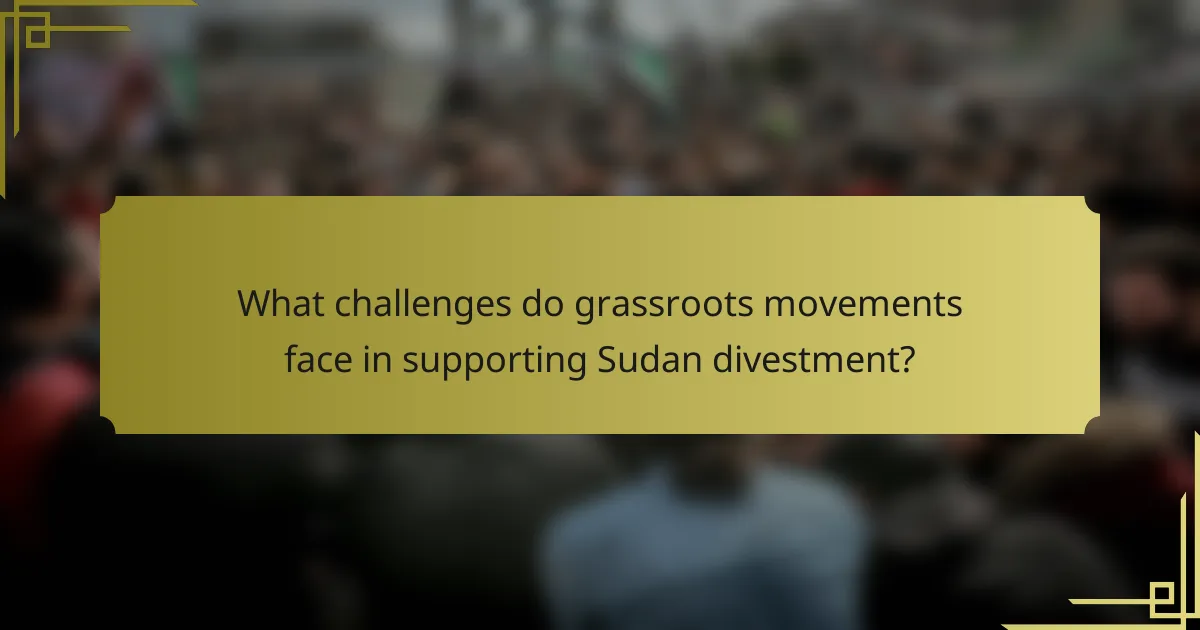
What challenges do grassroots movements face in supporting Sudan divestment?
Grassroots movements face significant challenges in supporting Sudan divestment. Limited funding restricts their ability to mobilize resources effectively. Lack of awareness among the general public hinders recruitment and engagement efforts. Legal barriers complicate the process of divesting from companies linked to Sudan. Additionally, political opposition can obstruct initiatives aimed at promoting divestment. The complexity of global supply chains makes it difficult to trace investments accurately. Furthermore, grassroots movements often struggle to maintain momentum over time. These challenges collectively undermine their effectiveness in advocating for Sudan divestment.
How do political obstacles affect grassroots initiatives?
Political obstacles hinder grassroots initiatives by creating barriers to funding, advocacy, and public support. These obstacles can manifest as restrictive legislation or lack of governmental support. For instance, laws limiting campaign financing can reduce the resources available for grassroots movements. Additionally, political opposition can lead to negative media portrayals, undermining public trust in these initiatives. When grassroots movements face such challenges, their ability to mobilize community support diminishes. This, in turn, affects their capacity to influence policy and drive change. Research shows that successful grassroots initiatives often rely on favorable political environments to thrive. Without such support, grassroots efforts may struggle to achieve their goals.
What are common misconceptions about grassroots movements?
Common misconceptions about grassroots movements include the belief that they lack organization and structure. In reality, many grassroots movements have well-defined goals and strategies. Another misconception is that they are ineffective. Historical examples, such as the Civil Rights Movement, demonstrate their significant impact. Some also think grassroots movements are only local. However, many have national and global reach, as seen with climate change initiatives. Additionally, there is a belief that they are solely driven by a small group of activists. In truth, they often involve broad community participation.
How do funding issues impact these movements?
Funding issues significantly hinder grassroots movements supporting Sudan divestment initiatives. Limited financial resources restrict outreach efforts and campaign activities. Without adequate funding, these movements struggle to mobilize supporters and raise awareness. This lack of resources can lead to diminished visibility and reduced impact on policymakers. Additionally, funding constraints may limit the ability to conduct research and gather data to support their claims. Consequently, movements may face challenges in sustaining long-term initiatives. Historical examples show that well-funded movements tend to achieve greater success in influencing policy changes. In contrast, underfunded initiatives often fail to gain traction and achieve their goals.
What are the success stories of grassroots movements in Sudan divestment?
Grassroots movements in Sudan divestment have achieved notable successes. One significant success is the mobilization of college students across the United States. They advocated for universities to divest from companies linked to the Sudanese government. This collective action led to over 30 universities implementing divestment policies by 2010.
Another success story involves faith-based organizations. They organized campaigns highlighting the ethical implications of investing in Sudan. Their efforts resulted in several religious institutions divesting millions from Sudan-related investments.
Additionally, grassroots activists successfully pressured local governments to adopt divestment measures. For instance, the city of San Francisco passed a resolution to divest from Sudan in 2007. This local action inspired similar initiatives in other cities.
These movements have raised awareness about human rights abuses in Sudan. They have also demonstrated the power of community organizing in influencing financial decisions. The combination of student activism, religious group involvement, and local government actions showcases the effectiveness of grassroots efforts in Sudan divestment.
What notable achievements have these movements accomplished?
Grassroots movements supporting Sudan divestment initiatives have successfully raised awareness about human rights abuses in Sudan. They have mobilized public opinion and garnered significant support for divestment from companies operating in Sudan. These movements have influenced institutions, leading universities and pension funds to divest billions from Sudanese interests. Legislative changes have occurred in several states, promoting divestment policies against Sudan. Notably, the Sudan Accountability and Divestment Act of 2007 was enacted, facilitating such actions. These achievements have pressured the Sudanese government to address human rights violations. Overall, grassroots efforts have made significant strides in promoting ethical investment practices.
How have these successes influenced public perception?
Successes in grassroots movements supporting Sudan divestment initiatives have significantly shifted public perception. Increased awareness of human rights violations in Sudan has mobilized public support. Campaigns have effectively educated communities about the implications of investments in Sudan. As a result, many individuals now view divestment as a moral obligation. Public demonstrations and social media campaigns have amplified these sentiments. Research indicates that grassroots efforts have led to policy changes in various institutions. Notably, major universities and pension funds have reconsidered their investment strategies. This collective action has fostered a sense of solidarity among supporters. Overall, these successes have transformed public understanding of divestment as a powerful tool for social change.
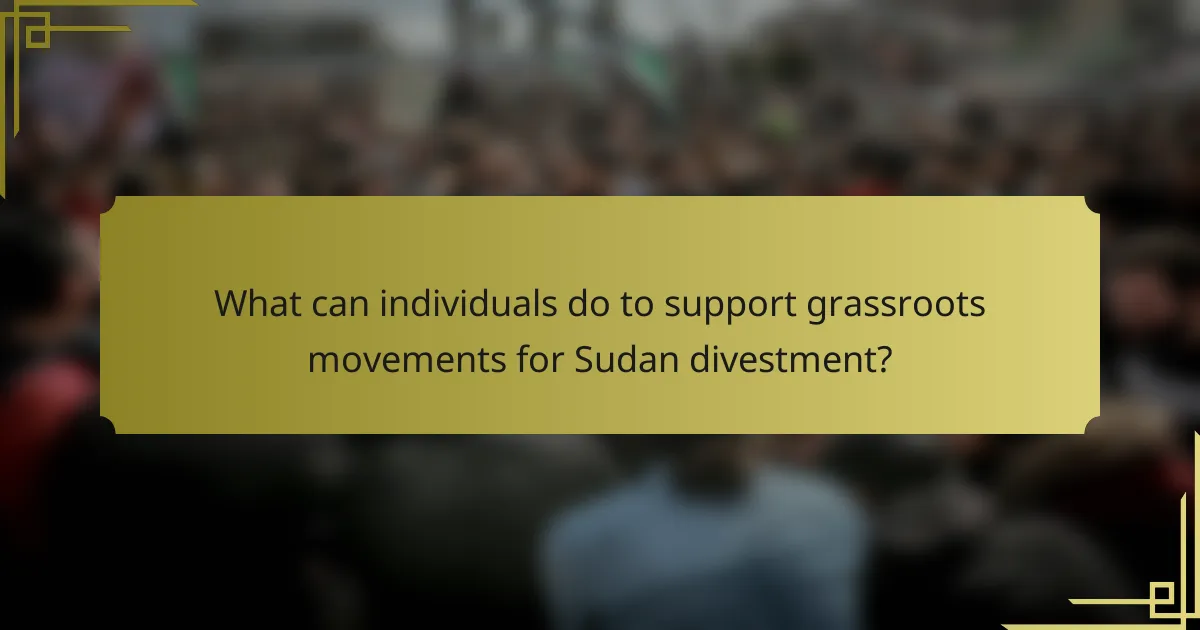
What can individuals do to support grassroots movements for Sudan divestment?
Individuals can support grassroots movements for Sudan divestment by actively participating in campaigns. They can join organizations focused on raising awareness about the issue. Individuals should engage in social media advocacy to spread information and mobilize others. Attending local events or protests can amplify the movement’s visibility. They can also contribute financially to organizations working on divestment initiatives. Writing letters to elected officials can influence policy decisions related to divestment. Educating themselves and others about the situation in Sudan is crucial for informed advocacy. Collaborating with community groups can strengthen grassroots efforts for change.
How can people get involved in grassroots initiatives?
People can get involved in grassroots initiatives by participating in local organizations and campaigns. Joining community meetings helps individuals understand the issues at hand. Volunteering time for events or outreach activities is crucial. Donating resources or funds can significantly support these initiatives. Engaging in social media campaigns raises awareness and mobilizes others. Signing petitions amplifies collective voices for change. Attending rallies and protests shows solidarity and commitment. Collaborating with like-minded individuals strengthens the movement’s impact.
What are effective ways to raise awareness in local communities?
Effective ways to raise awareness in local communities include organizing informational events and utilizing social media campaigns. Informational events, such as community meetings or workshops, allow direct interaction and education on specific issues. These events can foster discussion and provide resources for attendees. Social media campaigns can reach a broader audience quickly. Platforms like Facebook and Twitter can disseminate information rapidly and engage community members.
Collaboration with local organizations enhances outreach. Partnering with schools, churches, and nonprofits can amplify messages and resources. Engaging local influencers or respected community members can also lend credibility to initiatives.
Distributing flyers and newsletters can provide tangible information that community members can refer to later. This method ensures that key messages remain visible. Additionally, organizing volunteer opportunities can create a sense of ownership and involvement among community members.
Finally, surveys and feedback forms can help assess community awareness and interest levels. This data can inform future strategies and ensure that efforts align with community needs.
What resources are available for supporting Sudan divestment efforts?
Resources available for supporting Sudan divestment efforts include various organizations and coalitions. Groups like the Sudan Divestment Task Force provide tools and information for activists. The U.S. State Department offers guidelines on ethical investment practices. Academic institutions often publish research on the impact of divestment. Online platforms facilitate fundraising and awareness campaigns. Additionally, social media is a powerful tool for mobilizing support. These resources help individuals and organizations advocate for divestment from Sudan.
Where can individuals find information on active grassroots movements?
Individuals can find information on active grassroots movements through various online platforms. Social media sites like Facebook and Twitter often host pages dedicated to specific movements. Websites of organizations involved in grassroots activism provide updates and resources. News outlets frequently cover grassroots initiatives, offering insights and developments. Online forums and community boards also share information and connect activists. Additionally, email newsletters from advocacy groups can deliver timely updates directly to subscribers. These sources collectively ensure access to current information on grassroots movements.
What tools are available for organizing local campaigns?
Tools available for organizing local campaigns include social media platforms, email marketing software, and event management applications. Social media platforms like Facebook and Twitter enable grassroots organizers to reach a wide audience quickly. Email marketing software such as Mailchimp allows for targeted communication with supporters. Event management applications like Eventbrite help in planning and promoting local gatherings. Additionally, collaboration tools like Slack facilitate team communication and coordination. These tools enhance outreach and engagement, making local campaigns more effective.
What best practices should individuals follow when engaging with grassroots movements?
Individuals should prioritize active listening and understanding when engaging with grassroots movements. This involves being open to diverse perspectives within the movement. Effective communication is essential; individuals should articulate their thoughts clearly and respectfully. Building relationships with fellow activists fosters collaboration and strengthens the movement. Participating in local events and meetings helps individuals stay informed and connected. Volunteering time and skills can significantly benefit the movement’s initiatives. Educating oneself about the cause enhances credibility and effectiveness in advocacy efforts. Finally, maintaining a commitment to the movement’s goals ensures sustained engagement and impact.
Grassroots movements supporting Sudan divestment initiatives are organized efforts aimed at encouraging individuals and institutions to withdraw investments from companies operating in Sudan due to human rights abuses. The article outlines how these movements raise awareness, mobilize community support, and advocate for ethical investment practices through campaigns, protests, and educational events. Key characteristics include community-driven participation, use of social media for outreach, and collaboration with local organizations. Additionally, the article discusses the ethical implications of divestment, the impact on the Sudanese economy, challenges faced by these movements, and successful case studies that demonstrate their influence on public perception and policy changes.
